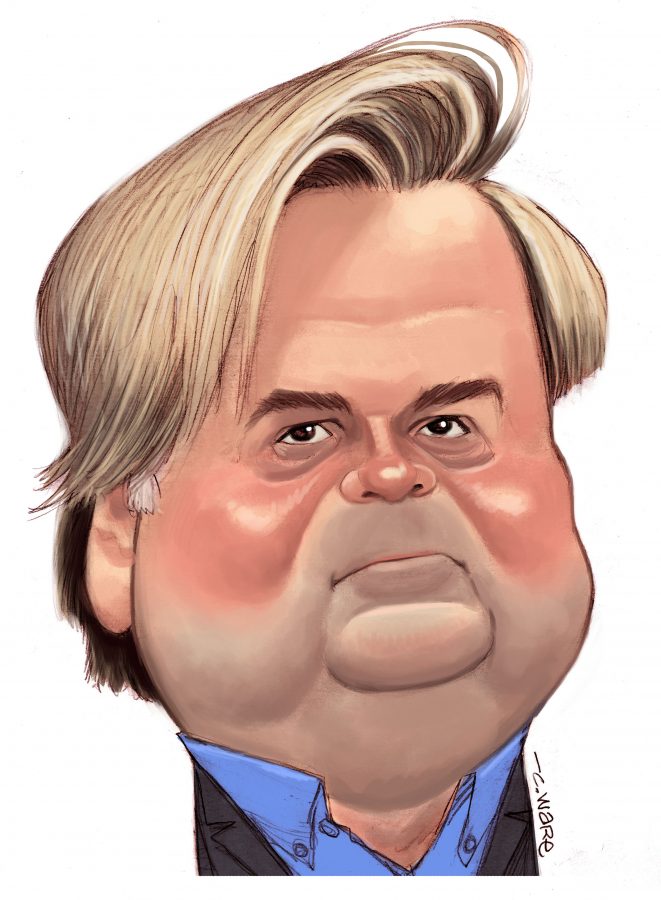Trump shows political inexperience with national security changes
Illustration courtesy of Chris Ware
Chris Ware caricature of Steve Bannon. Bannon is an American campaign manager, businessman and media executive. He became chief executive officer of the 2016 presidential campaign of Donald Trump in August 2016.
Feb 1, 2017

T
his weekend, President Donald Trump promoted Chief Strategist Stephen Bannon to take on the responsibilities of a member of the Principals Committee on the National Security Council.
This position is usually held by top intelligence and military officials. Bannon will sit among top cabinet members including the secretary of state, the secretary of defense, the secretary of homeland security and the national security advisor.
When elevating Bannon’s role into the committee, Trump also demoted the director of national intelligence and the chairman of the joint chiefs of staff.
Get The Daily Illini in your inbox!
The National Security Council’s Principals Committee discusses highly confidential plans to maintain the safety of the country. In the past, Obama has deliberated with the committee on attack strategies against Al Qaeda in Afghanistan and Pakistan. Previous presidents have used the council to discuss war plans in Vietnam and Iraq.
Allowing a political operative to be a part of such crucial decisions is dangerous. Regardless of whether one’s own political views align with either Trump’s or Bannon’s, it’s difficult to prove that a seasoned expert with years of experience in foreign affairs and war strategies is less qualified than a political aide and former Goldman Sachs banker who ran the far-right website Breitbart News.
Some will argue that Bannon’s former role as a Navy officer qualifies him for the job. Although his experience more than 20 years ago may provide some insight into military operations, one cannot ignore that he was chosen over lieutenants and admirals who are currently serving.
Others point out that Obama’s chief strategist, David Axelrod, sat in on several committee meetings during his administration. However, Axelrod was never confirmed as a regular member. He revealed that he never participated directly in the decisions but only sat in to observe.
If Bannon’s appointment was not based on his exceptional qualifications, one can conclude that Trump picked him based on trust and confidence. By doing so, he allows Bannon to participate in some of the most crucial national security decisions for the country.
If this is the reasoning behind Trump’s stunning move to appoint a political aide into a situation where politics should not play a major part in determining the safety of our citizens, it ultimately displays a lack of professionalism on his part. Making decisions based on a whim and disregarding the impact of those decisions on others is not only careless and selfish, but also exposes a complete lack of political experience.
Bannon’s promotion is not the only time that Trump has exposed his disorganization and lack of professionalism in his presidency.
The confusion surrounding the exact implications of Trump’s executive order limiting immigration from the Middle East was very apparent. Immigration officers stopped citizens from seven countries from entering the U.S. Some were even sent back overseas. Some of these people were also U.S. permanent resident green card holders.
It took nearly an entire day for Reince Priebus, the chief of staff, to clarify that this ban does not apply to green card holders. The uproar and controversy that sprang from this was enormous. Americans demonstrated their disapproval in airports, blasted angry messages on social media and signed petitions.
Again, putting aside my own stance on this executive order, Trump’s inability to effectively clarify the legalities of his executive order, and his unwillingness to take the careful time and consideration to go over the miniscule details, reveals another aspect of his inexperience for the role of the presidency.
According to the New York Times, the secretary of homeland security, along with other cabinet officials, were in the process of reviewing the order when they realized the president had already signed it without their legal review. CNN reported that the Trump administration failed to release the full document of the executive order and a list of the officially banned countries until hours after the announcement.
The confusion and disarray that erupted from the executive order could’ve been easily avoided with careful discussion and consultation with cabinet members and prior notice to the public. Many American visa-holders were in the middle of international travel when the order was released, unaware that their re-entry into the country may become a lengthy battle. Trump’s decision to sign the order based on his own confidence caused unnecessary disorganization and frustration, revealing once again his incompetence.
In certain situations, taking action quickly and taking risks is necessary. But in many circumstances, a president’s role is to carry out what is best for the country with careful consideration and professionalism, rather than wearing a crown and pounding out rules to his own liking.
If President Trump wishes to implement his ideas to “make America great again,” he must understand the gravitas that a presidential role commands — the ability to run a country with the professionalism and experience of a leader who listens to the grievances of the people and carries out solutions with finesse.
Minju is a sophomore in Media.
[email protected]






